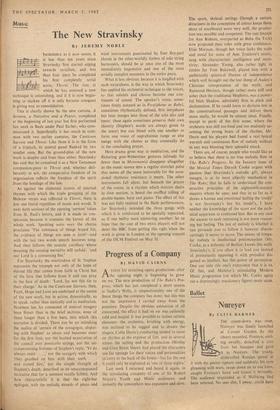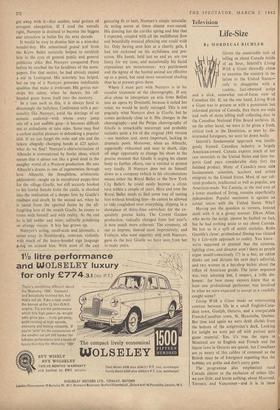Ballet
Nureyev
By CLIVE BARNES
got away with it—that sudden, total gesture of arrogant abnegation. If I read the entrails right, Nureyev is destined to become the biggest star attraction in ballet for the next decade.
It would be easy to dismiss him as a nine-day wonder-boy. His sensational grand jete from the Kirov Ballet naturally helped to establish him in the eyes of general public and general ' publicists alike. But Nureyev conquered Paris before he reached the fat headlines of the news- papers. For that matter, he had already caused a stir in Leningrad. His notoriety has helped, but on top of it Nureyev possesses indefinable qualities that make it irrelevant. His genius out- strips his talent; when he dances, his off- handed grace burns itself into the memory.
In a case such as this, it is always hard to disentangle the ballyhoo. Confronted with a per- sonality like Nureyev, amid the stirrings of an ecstatic audience—with whom every jump sets off a just audible gasp—it becomes difficult not to attitudinise or take sides. Some may find a certain dutiful pleasure in debunking a popular idol. If we can forget the oohs and ahs and the tickets allegedly changing hands at £25 apiece. what do we find? Nureyev's characterisation of Albrecht is conventional by Soviet ideas, which means that it shines out like a good deed in the naughty world of a Western production. He sees Albrecht's drama as one of regeneration through love. Albrecht, the thoughtless, aristocratic philanderer, caught up in enraptured puppy-love for the village Giselle, but still securely hooked to his lawful fiancée from the castle, is shocked into the realisation of a deeper love by Giselle's madness and death. In the second act, when he is saved from the spectral furies by the all- forgiving love of the wraith Giselle, he comes to terms with himself and with reality. At the end he is left sadder and wiser, solitarily pondering on strange visions. A boy has grown up.
Nureyev's acting, small-scale and idiomatic, a mime essay in Stanislaysky, contrasts violently pith, much of the heavy-handed sign language &ding on around him. With most of the cast gesturing fit to bust, Nureyev's simple naturalis- tic acting seems at times almost over-casual. His dancing has the cat-like spring and bite that I expected, coupled with all the mellifluous flow and beautifully musical phrasing one could wish for. Only having seen him at a charity gala, I had not reckoned on his stylishness and pre- cision. His hands, held just so and so, are too fancy for my taste, and occasionally his facial expressions are monotonous: wry puzzlement and the agony of the hunted animal are effective up to a point, but need more emotional shading than he at present gives them.
Where I must part with Nureyev is in his cavalier treatment of the choreography. If any diva chose to interpolate an aria from Bellini into an opera by Donizetti, because it suited her voice, we would be justly outraged. This is not precisely what Nureyev does in Giselle, but he comes perilously close to it. His changes in the choreography—and the Petipa choreography of Giselle is remarkably uncorrupt and probably includes quite a lot of the original 1841 version —are tasteless and, more important, lacking in dramatic point. Moreover, when an Albrecht, supposedly exhausted and near to death, slips off stage apparently to change his shoes at the precise moment that Giselle is urging his absent body to further efforts, one is entitled to protest very loudly. If Nureyev does not tie himself down to a company (which in his circumstances means either the Royal Ballet or the New York City Ballet), he could easily become a circus turn within a couple of years. Here and now the Royal Ballet needs to find some way of taming him without breaking him—he cannot be allowed to ride roughshod over everything, slipping in a showpiece of thirty-four entrechats for the ex- quisitely precise kicks. The Covent Garden production, radically changed from last year's, is now much more coherent. The company, all out to impress, danced most impressively; and Fonteyn, who went superbly well with Nureyev, gave us the best Giselle we have seen from her in many years.



































 Previous page
Previous page